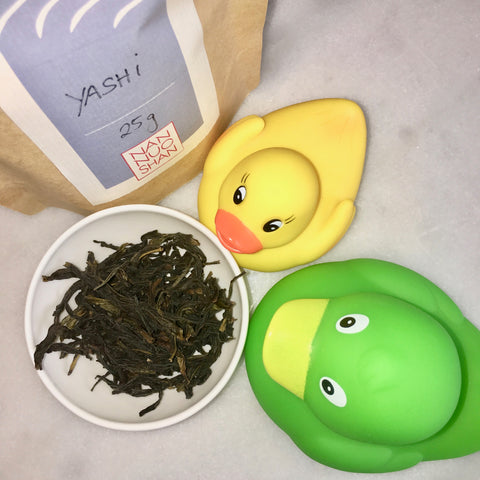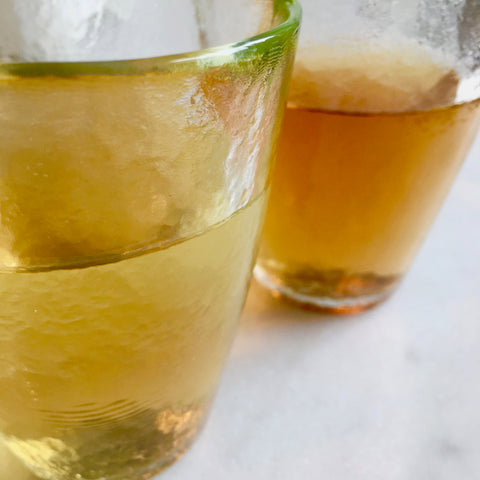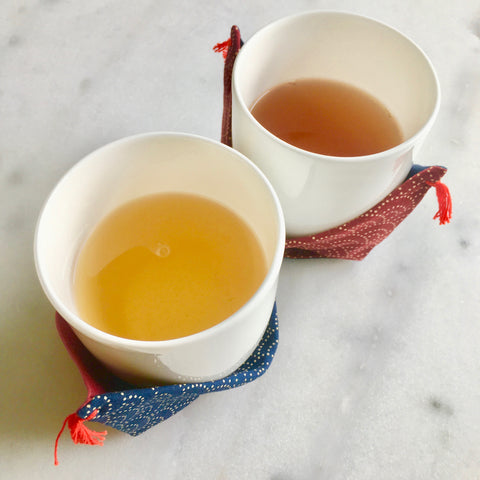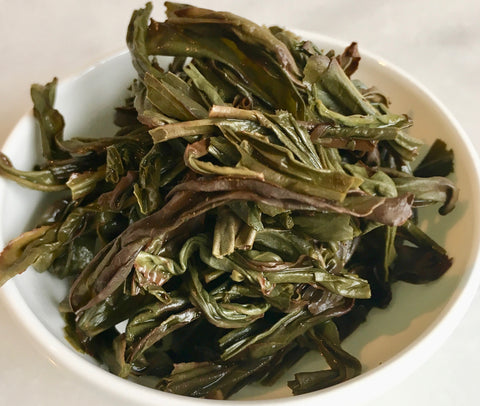Poultry tea? Really?
Are you familiar with these wild associations that run in your head when you listen to music, perceive scents, or look at pictures? Often a tea motivates me to listen to certain music; another time it's the other way around.
I sometimes enjoy Indian ragas with Indian tea, for example from Grandmaster Ravi Shankar, I pair East African teas with music from West Africa. Not quite appropriate, but as the great Franconian philosopher Lothar Matthäus would probably put it: "Argentina, Angola, doesn't matter as long as it's Africa."
When listening to the song "Bombay Duck", I do not associate Indian tea or even a crispy duck with it, I rather associate Duck Shit. Bombay Duck is a fish anyway, not a duck. But this is another story for another day.
Duck Shit, also written Duck Sh*t or Duck Feces in politically correct English, is called Ya Shi Xiang in China. Is this naming particularly clever or particularly bad marketing? Anyway, Duck Shit it is today. By chance there is also a sample of Chicken Cage or Ji Long Kan in my stash, so I spontaneously decide for a parallel tasting.

Critical view from a birds perspective
An unfair comparison certainly, because the Duck Shit recently arrived fresh as new, while the Chicken Cage has been maturing for several months and features quite some roasting. This is also shown by the first infusion, which is clearly light yellow for the duck, but rather caramel-coloured for the chicken. Since stronger roasted oolongs have a longer shelf life, however, we don't want to be too picky here.
But in the end these two birds did not want to be pussies, and only the strong survive the boiling water. And yet again my thoughts drift away, this time into ancient China. So I brew up the poultry broths; after all, centuries ago tea was also called broth or soup, it was salted and seasoned and vegetables were certainly added now and then. But I do not intend to go down this ancient tea road today.
So I start with 5g each on 150ml water; I like to brew my tea a little stronger and let it steep a bit shorter, this time for 30 seconds.


Comparison of the first infusion, left Ya Shi Xiang, right Chicken Cage.
The Ya Shi smells fruity and floral and slightly almond-flavoured, the Chicken Cage just slightly mineral. The Ya Shi tastes as it smells, but not as almondish as a Xingren Xiang, for example, only a delicate touch can be discovered. The Chicken Cage shows a little bit of the charcoal of its roasting and is marginally bitter, much aroma is not yet to be discovered.
Now several infusions of 45 seconds each follow. The Ya Shi retains the very tender almond for a short time, then an explosion of geranium and pear juice occurs. Oily aroma, not watery, wonderful in the mouth with an aftertaste that hopefully invites you to kiss (I expect my wife back home soon). The minerality of the Chicken Cage decreases, but hardly the roasted aroma or the charcoal. Not uncomfortable, but you have to know what you want. I certainly do, personally I can win a lot from both tender floral and strongly roasted dancongs. And the first two infusions of a Da Hong Pao are also allowed to show the charcoal clearly, but this should be enough then. Unfortunately the Bai Ji Guan is not at hand right now, I would certainly like it more, plus its English name is White Cock Crest, so it would fit into today's context.
After the sixth infusion I increase the brewing time to one minute and do well with it. Gradually the intensity decreases, but fortunately the Hui Gan (sweet or pleasant aftertaste, recurring feeling) remains. There is still not much aroma to discover in Chicken Cage, there are certainly better productions. To save its honor, however, it should be mentioned that it also gives a great Hui Gan, but unfortunately this is almost all it offers.

It's not over yet, it has only just begun.
To intensify the chicken cage tasting I play "Money for nothing", don't the lyrics say "and the chicks for tea"? ;-)
Can tea get you high? Stimulate the synapses? Many experts and laymen are convinced of this. Is it possible to drink too much tea? Personally, I don't think so.
It just strikes me how closely ducks and chickens are also linked in music. If you sing "All my little ducklings" to little kids, in Spanish this is the acoustically very related "Los pollitos dicen", so here the chicken fledglings are the protagonists.
Well, enough now with these wild associations. I want to enjoy the further infusions. If you did not like my thoughts, do not take them too seriously. I'm a vegetarian, what do I know about poultry? And if you ask yourself: "what did he have today", that is written further up. Without additives. No milk, no sugar.
Listening tip: "Bombay Duck" by The Regulars and "Money for nothing" by Dire Straits. Reading tip: "Chicken Soup for the Soul" by Canfield and Hansen.
Written by Jens





